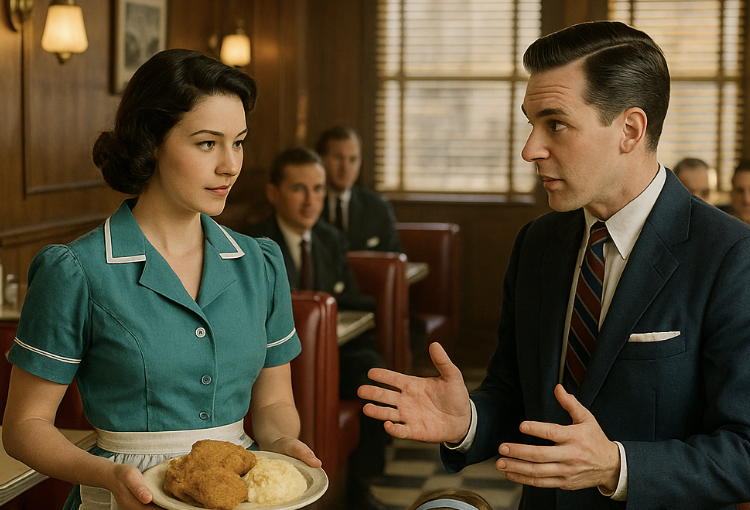On a rain-lashed evening in a sleepy town, a young waitress named Emily Parker spotted four little girls pressed to the fogged window of her diner. Their sweaters were ripped, their cheeks chalky, and in their eyes lived the quiet ache of hunger and being nobody’s child. Emily felt something pull tight inside her chest. These girls had no hand to hold, no warm doorway to step through.
Before she had time to think, she hurried them in out of the weather and lined the counter with four steaming plates. That small, ordinary mercy—forks, napkins, a place to sit—would, without her realizing, reroute the next twelve years of her life.
A vow made over supper
From that night forward, Emily made a private promise. After closing the register and flipping the Open sign to Closed, she swept tips into a jar marked “the girls.” She learned the thrift store hours by heart, hunting for coats with working zippers and shoes that still had tread. She gathered notebooks, taped spines back together, sharpened pencils down to nubs, and every evening sat the girls at her scarred kitchen table to sound out letters until words turned into stories.
For a decade, Emily was the gravity of their small world. She worked doubles, skipped dinners, and shelved her own half-formed dreams without complaint. And each time she watched the girls lick their spoons clean and lean back smiling, she knew exactly why the sacrifices never felt like losses.
The town that loves to whisper
The neighborhood noticed—then it judged. People muttered that Emily was throwing her life away on children that weren’t hers. A few smirked that she was feeding futures that would never rise. On the worst days, even Emily’s faith thinned. How long could one woman stretch herself?
But whenever a little hand slid into hers and a voice breathed, “Mama Emily,” doubt went quiet. Love, once chosen, kept being chosen.
The engine in the dark
One evening, after another ten-hour shift, Emily sat on her wobbly wooden chair, cupping tea and savoring the hush that followed a clean kitchen. From the far end of her street came the low growl of an engine—not the coughing rattle she knew from her neighbors, but a purr, expensive and sure of itself.
Headlights rolled closer. A black SUV, slick as rainwater, glided to a stop in front of her peeling porch. Emily set down her cup, palms damp. Nothing like that ever stopped here.
The driver’s door swung wide. A tall man in a suit stepped out, hurried around, and opened the rear doors like he’d rehearsed it. Four young women stepped onto the wet street—poised, elegant, taking in the small house with soft, searching eyes.
Faces she knew by heart
For half a breath, Emily didn’t place them. They looked like the future: straight backs, sure steps, a glow that comes from being wanted by the world. And then recognition arrived like lightning—so bright it hurt. It was them. Her girls.
They were already running. The porch groaned beneath the rhythm of their feet.
“Mama Emily!” one cried, the name ringing down the years like a bell. Whatever thin walls remained inside Emily—fear, unworthiness, old exhaustion—crumbled. Tears surged fast and hot.
They folded her into their arms until the old chair scraped back. Emily sobbed against their shoulders, laughter tangled with relief in every breath.
Words that closed every wound
When she found her voice, it was ragged and shining. “Just look at you,” she whispered. “My beautiful girls. What have you become?”
One stepped back, still holding both of Emily’s hands. “We became who we are because you decided we mattered,” she said, eyes bright.
Another dug into her bag and placed a small silver key in Emily’s trembling palm. Emily blinked at the cool metal, then up at the faces she loved. The young woman nodded toward the curb. “The car is yours, Mama Emily. And this is only a beginning.”
Emily’s knees softened. Breath stuttered.
A third spoke, gentler still. “We bought you a home. No more scraping by. No more choosing between the light bill and groceries. You’re done with that.”
Emily stood anchored to the porch boards, clutching the key as if it might float away if she loosened her grip.
The harvest of a thousand small yeses
They gathered close around her, a ring of warmth against the damp. “You gave us hope when hope was a rumor,” one said. “You loved us when doors shut,” said another. “Every night we asked for a mother,” a third added, “and you arrived.”
Tears slid freely as memories flared—nights Emily went to bed hungry so four bowls could be filled, hems stitched by lamplight, sharp words from neighbors that she swallowed and turned into silence. And in front of her now stood the answer to all of it: four women—capable, luminous, unafraid.
One thumb brushed away Emily’s tears. “Everything you poured out, we bring back to you today.”
“I never did it to get anything,” Emily murmured. “I just wanted you to have a chance.”
“And because of you,” the eldest said, smiling, “we don’t just have a chance. We have a horizon.”
The road to “home”
They guided her down the steps like she was the most precious thing they owned. Curtains twitched along the block; the very mouths that once judged fell quiet. Emily slid into the SUV’s soft leather and ran her fingers over the stitching as if reading braille: you are safe, you are seen.
They drove past streets she knew by the potholes and turned into a neighborhood she’d only visited in daydreams. The house waiting for her was sunlit even in the rain, wide windows catching whatever light the sky could spare, a garden braiding color along the path.
Emily stepped out on unsteady legs. “Is this… Is this mine?” The question came out as breath.
Four heads nodded, eyes shining. “We bought it for you, Mama Emily. This is your address now.”
She covered her face and wept. They wrapped her up again, like the first time—twelve years ago, cold and frightened and on the edge of believing.
What counts, and what doesn’t
Standing on the threshold, Emily understood: love had not only re-scripted four childhoods; it had revised her fate sentence by sentence. Wealth, she realized, was not what stacked in accounts but what multiplied in people. The ledger of her life—once inked with worry and scarcity—now balanced in joy.
As the evening eased toward dusk behind her new windows, Emily whispered, “God answered. He gave me daughters. He gave me a family.”
That night, for the first time in years, she fell asleep without bargaining with tomorrow—no lists, no calculations—only the deep, anchoring quiet of belonging. Surrounded by the love she once gave away, she finally lay down in peace.



